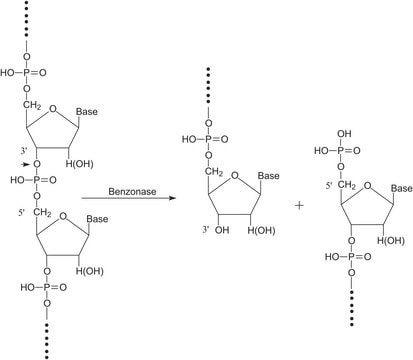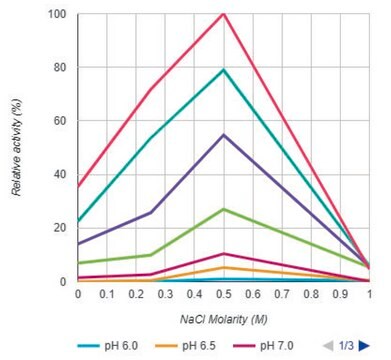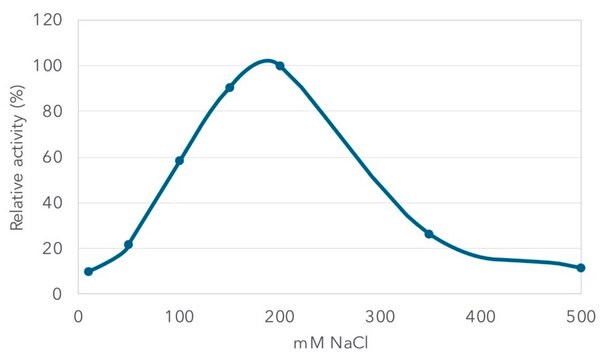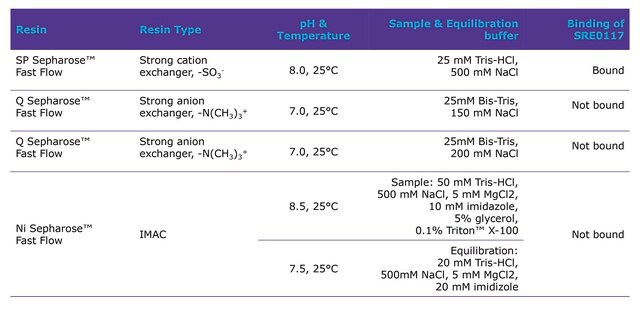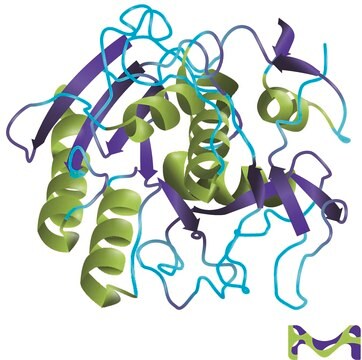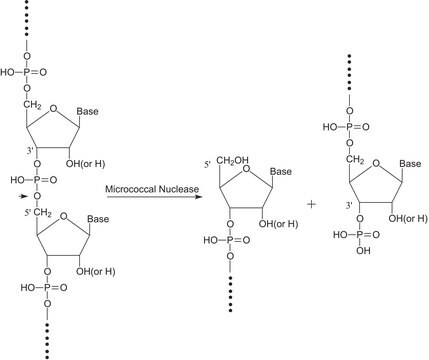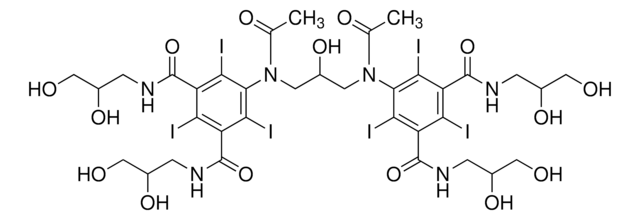SRE0015
Salt Active Nuclease (SAN)
recombinant, expressed in Pichia pastoris
Sinónimos:
Endonucelase, Salt active endonuclease
Iniciar sesiónpara Ver la Fijación de precios por contrato y de la organización
About This Item
UNSPSC Code:
12352204
NACRES:
NA.54
Productos recomendados
biological source
fermentation/recombinant
Quality Level
recombinant
expressed in Pichia pastoris
form
buffered aqueous glycerol solution
specific activity
≥250000 U/mg
technique(s)
DNA extraction: suitable
suitability
suitable for nucleic acid purification
application(s)
cell analysis
shipped in
wet ice
storage temp.
−20°C
Categorías relacionadas
Application
Salt active nuclease has been used to remove DNA during protein expression and purification.
Biochem/physiol Actions
Salt active nuclease (SAN) is a general, unspecific endonuclease that cleaves double-stranded and single-stranded DNA, and RNA. SAN is active at above neutral pH. Unlike other nucleases, however, it has optimum activity at high concentrations of salt at high pH. These qualities make SAN ideal for removal of DNA from cell extracts and protein samples. The end-products upon complete degradation of DNA consist of a majority of 5 nucleotide
oligos. The enzyme degrades DNA vs. RNA in a ratio of 10:1.
SAN is highly active over the temperature range 10-40 °C. The optimal NaCl-concentration for activity is 0.5 M. However, SAN is active in low salt buffers. 1 M NaCl is not recommended for use of SAN. Mg2+ (>1 mM) is required for activity. The pH working range is above neutral pH, with an optimal range between pH 8.5-9.5
Physical form: Solution in 25 mM Tris-HCl (pH 7.5), 5 mM MgCl2, 0.5 M NaCl, 0.01% Triton, and 50% (v/v) glycerol
Unit definition: One unit (U) is defined as an increase in absorbance at 260 nm of 1 Absorbance Unit in 30 minutes at 37 ºC, using 50 μg/ml calf thymus DNA in a buffer with 25 mM Tris-HCl (pH 8.5, 25 ºC), 5 mM MgCl2, and 500 mM NaCl.
oligos. The enzyme degrades DNA vs. RNA in a ratio of 10:1.
SAN is highly active over the temperature range 10-40 °C. The optimal NaCl-concentration for activity is 0.5 M. However, SAN is active in low salt buffers. 1 M NaCl is not recommended for use of SAN. Mg2+ (>1 mM) is required for activity. The pH working range is above neutral pH, with an optimal range between pH 8.5-9.5
Physical form: Solution in 25 mM Tris-HCl (pH 7.5), 5 mM MgCl2, 0.5 M NaCl, 0.01% Triton, and 50% (v/v) glycerol
Unit definition: One unit (U) is defined as an increase in absorbance at 260 nm of 1 Absorbance Unit in 30 minutes at 37 ºC, using 50 μg/ml calf thymus DNA in a buffer with 25 mM Tris-HCl (pH 8.5, 25 ºC), 5 mM MgCl2, and 500 mM NaCl.
Unit Definition
One unit (U) is defined as an increase in absorbance at 260 nm of 1 absorbance unit (AU) in 30 minutes at 37 °C, using 50 μg/ml calf thymus DNA in a buffer with 25 mM Tris-HCl (pH 8.5, 25 °C), 5 mM MgCl2, and 500 mM NaCl.
Storage Class
10 - Combustible liquids
wgk_germany
WGK 2
flash_point_f
Not applicable
flash_point_c
Not applicable
Elija entre una de las versiones más recientes:
¿Ya tiene este producto?
Encuentre la documentación para los productos que ha comprado recientemente en la Biblioteca de documentos.
Los clientes también vieron
Transcriptome engineering with RNA-targeting type VI-D CRISPR effectors
Konermann S, et al.
Cell, 665-676 (2018)
Nuestro equipo de científicos tiene experiencia en todas las áreas de investigación: Ciencias de la vida, Ciencia de los materiales, Síntesis química, Cromatografía, Analítica y muchas otras.
Póngase en contacto con el Servicio técnico